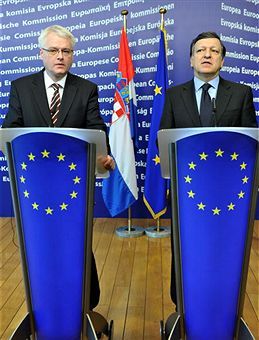 A lot of things, you will agree, have changed since 1983 – even in the world of diplomacy. For one, the EU has moved from a loose federation of states towards a new kind of polity – never a United States of Europe, heaven forbid, but more than just a loose arrangement of member-states.
A lot of things, you will agree, have changed since 1983 – even in the world of diplomacy. For one, the EU has moved from a loose federation of states towards a new kind of polity – never a United States of Europe, heaven forbid, but more than just a loose arrangement of member-states.
But reading George Walden’s comment about Europe’s putative diplomatic service in the Times I can’t help but feel that he is still living in the age when he left the Foreign Office – when David Cameron was 17.
The EU diplomatic service is not the novelty that pro-Lisbon politicians claim. To a large extent, it already exists in the more than 120 European Commission delegations and the 11 high-level EU envoys. Head of EU delegations are called ambassadors and though they have until now shared responsibility for presenting the EU with embassies from the rotating EU Presidency, they have operated exactly in the way that the former mandarin suggests can never happen.
Together, the EU delegations and rotating EU Presidency legations, have taken instructions from committees in Brussels where EU member-states thrash out a common view. It has not worked well in all cases, but in Europe’s neighbourhood it has worked very effectively. In future, the coordinating function will be vested in one local person, not two – but that’s hardly a dramatic change.
The key is: the system only works with the full participation of EU states; it will not work if the EU diplomatic service tries to replace these states. A good example is in Skopje where the EU’s man works with all the present European ambassadors – coordinating positions, responding to their input, representing their views – but is seen by them as the primus inter pares. When tough messages have to be sent to the Skopje government, the EU’s man joins forces with the US ambassador. He needs the local European ambassadors and they find that he helps them advance their goals better than they can without him.
Oh – and he does his work without demanding a big car, expensive curtains and other frills. In fact, few modern diplomatic souses act like a Hyacinth Bucket caricature – and I too speak from personal experience.
Most EU governments know how the system works today as do a majority of EC officials. Some don’t, and they share with euroskeptics a common view – a zero-sum idea of the EU and European member-states. But the world has moved on from the simplicities of diplomatic work in 1983.






Comments